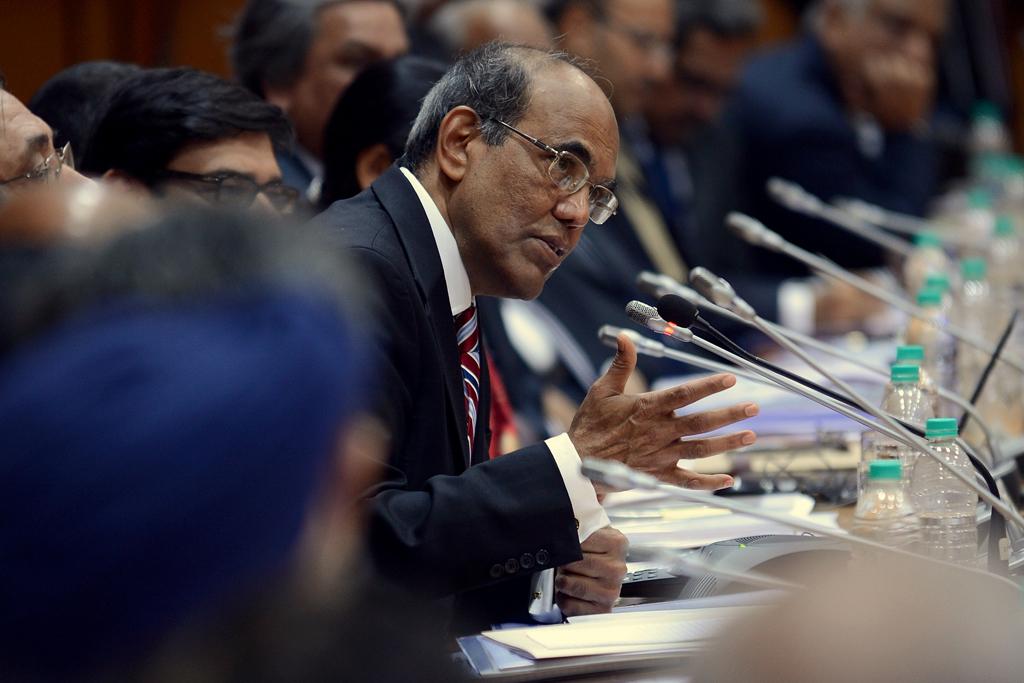Expect a far more dovish India central bank
Reserve Bank of India (RBI) Governor Duvvuri Subbarao speaks during a press conference in Mumbai, India, on Jan. 27, 2013. RBI, India’s central bank, is expected to introduce further monetary policy measures aimed at kick-starting the slowing economy.
The Reserve Bank of India (RBI) stood on the sidelines for much of 2012 as worries over runaway inflation trumped growth concerns. Now as price pressures abate, the central bank is expected to step up monetary easing significantly to revive flagging growth in Asia's third largest economy.
Experts forecast the RBI to cut its benchmark interest rate by up to 100 basis points to 6.75 percent by the end of the year, following a 25 basis point reduction in January — the central bank's first such move in nine months.
Expectations for increased dovishness stem from a sharper-than-expected slowdown in the economy — projected to grow just 5 percent in the fiscal year ending March 2013 from the 8-9 percent expansion seen in the past decade. A reversal in the inflation uptrend is another key factor.
"With the growth backdrop being weak and inflation coming off from a three-year high, at this point, the RBI will prefer delivering more easing rather than signaling that they have come to an end of the easing cycle," Rahul Bajoria, economist at Barclays, told CNBC on Friday.
India's closely-watched wholesale price index (WPI), released on Thursday, eased for the fourth consecutive month to 6.62 percent in January — the lowest level since November 2009. It could fall to around 6 percent by February, according Credit Suisse.
Albeit above the central bank's comfort zone of 4-5 percent, inflation is markedly lower than the 8 percent levels seen last year.
"Without wishing to tempt fate, this is beginning to look like a trend. We are happy to stick with our call of a 25 basis point repo rate cut at the RBI's March 19 meeting with a further such move on May 3," Robert Prior-Wandesforde, director of Asian Economics at Credit Suisse, wrote in a note.
Despite mounting pressure from the government to lower borrowing costs, the RBI cut interest rates just once last year — in April — due to persistent inflationary headwinds in the economy.
Prior-Wandesforde expects a further 50 basis points worth of rate cuts if consumer price inflation — which rose to 10.8 percent year-on-year in January from 10.6 percent in the previous month — declines and there are improvements in the current account deficit.
According to HSBC's chief India economist, Leif Eskesen, additional monetary easing in 2013 is not a done deal. While the RBI is likely to take some comfort from the decline in wholesale price inflation, there are a range of factors that will determine whether the central bank will loosen policy further, he said.
The continuation of structural reforms and the delivery of a credible budget, targeting fiscal consolidation, remain important pre-conditions for monetary easing, Eskesen noted. The government is due to deliver its budget on Feb. 28.
More from our partners at CNBC:
CNBC: Earnings preview: Make way for retailers
CNBC: SocGen’s Albert Edwards: Europe is cheap but not cheerful
CNBC: What currency war? Move along, G-20 leaders say
